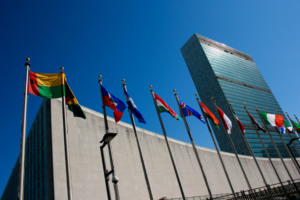By Matthew Taylor, Council on Foreign Relations–
The Venezuelan constitutional chamber’s decision last week to dissolve the National Assembly has made it abundantly clear that Maduro’s Venezuela is an authoritarian regime. The judiciary is at the beck and call of chavista forces, the military is corrupt and co-opted, and despite a last-minute reversal of the court’s decision, the continued dilution of the Assembly’s powers means that there are effectively no independent institutions left with the power to check the regime.
Venezuela, meanwhile, is confronting a humanitarian catastrophe. The regime has run up against the limits of its economic policy: foreign currency is too scarce to cover both debt obligations and desperately needed imports. Three quarters of Venezuelans have lost weight under the “Maduro diet”; more than two-thirds of basic goods are scarce. The regime seems willing to play out the clock, at grotesque human cost, guided by one core strategy: waiting for global oil prices to recover. But the hole is now so deep that a modest increase in oil prices— of the sort predicted for 2017— may be insufficient: debt payments due in 2017 outstrip foreign currency reserves.
Dictatorships sometimes crumble under the weight of their own contradictions, and this could yet be the case for Chavismo, given the depth of the crisis. Indeed, the uncertainty generated by the court’s action last week may be a sign of fissures within the regime. But as John Polga-Hecimovich and I noted last year, the Maduro regime has a clear strategy for repressing domestic opposition. Leaders who have mobilized against the regime are in jail. The military is fully in control of food supply and appears united against any regime change that might expose leading officers to prosecution for corruption or human rights abuses. The opposition has been fractured by the regime’s delay tactics, including the simulacrum of negotiations over the past year. Venezuelans are exhausted by the daily search for sustenance which, alongside regime repression, saps their ability to protest. Although Maduro walked back last week’s court decision, he retained the power to negotiate oil deals without congressional approval, a tool which may prove very important.
China or Russia could yet help Venezuela out of its hole. But China does not seem eager to play a geopolitical role and it has little to gain from saving a crisis-ridden regime in the Western Hemisphere from seemingly inevitable collapse. Russia, on the other hand, seems to be doing what it can to help Maduro through his hard spell: it is reported to be negotiating loans and further investments by Rosneft that might help the regime through a heavy bout of April debt payments.
The region has been slow to respond, but is at last finding its voice. Several countries withdrew their ambassadors over the weekend. Mercosur has been proactive: it suspended Venezuela from the trading bloc last year, and invoked its democratic clause over the weekend, which could culminate in Venezuela’s expulsion. The Organization of American States (OAS) has been proceeding more slowly, despite Secretary General Luis Almagro’s hectoring. Almagro’s hopes that Venezuela might be suspended under the Inter-American Democratic Charter continue to run up against simple math; although a few countries seemed to shift their stance last week, many Caribbean nations remain beholden to Maduro, meaning that Almagro may still be short of the votes he needs, even if a special session of the body meets today as originally planned (early reports suggests that the new Bolivian chair of the Permanent Council may suspend the session).
The Trump administration so far appears to be following the policies adopted by its predecessor. The United States has imposed targeted sanctions against individual Venezuelans, including Vice President El-Aissami, but has wisely avoided the temptation to more directly and unilaterally confront the regime, allowing Latin America to lead. But patience is wearing thin in Washington. A flurry of congressional declarations last week could presage more muscular legislative action in the months ahead; Senator Marco Rubio suggested that he would lean on recalcitrant OAS members, including by withholding assistance to countries that failed to support OAS action.
Policymakers hoping to encourage a peaceful resolution of the crisis must pinch their noses and maintain a channel for dialogue with the regime while giving regime hardliners guarantees of non-reprisal if— but only if— they facilitate a rapid transition. Dialogue has been unproductive in the past, but keeping talks open at least offers the possibility of a strategic exit for regime members. UNASUR has been playing a key role in encouraging dialogue; it may yet be an effective good cop to the OAS’s bad cop, provided it does not allow itself to be used as a convenient pretext for the Maduro regime to string out talks endlessly. Guarantees for regime members who cooperate in finding a way out of the crisis are needed to ensure that negotiations are not seen as a zero-sum game.
But the regime has played games for far too long to be trusted to negotiate in good faith. Simultaneously, therefore, regional governments must tighten pressure on the regime. The symbolic weight of an OAS suspension would be great— as Almagro said, “peer condemnation is the strongest tool we have.” But in addition to declaring the Venezuelan regime a pariah, regional and global allies could also help to keep hardliners over a barrel. Prosecutions, asset seizures, visa restrictions, and other sanctions would be most effective if they were employed not only by the United States, but also by Latin American and European allies.


Leave A Comment
You must be logged in to post a comment.